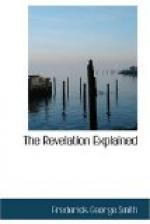When he invaded Russia, a territory outside of the Apocalyptic earth, he exceeded his mission, and there met with the most terrible overthrow. Although he entered that kingdom with the most magnificent army that he had ever gathered together, yet for suffering and disaster that famous retreat from burning Moscow stands without a parallel in history. It was not the Russian armies that prevailed against him; it was God that fought against him with the blasts of his north wind. These speedily silenced those tremendous parks of artillery that had thundered upon the fields of Jena, Friedland, Wagram, Marengo and Austerlitz, and scattered those invincible battalions that had marched triumphant over Europe. Ney, at the head of the National Guards, ever before victorious, was compelled to beat a hasty retreat, glad to escape with the smallest remnant of his host. Napoleon failed here because God had given him no mission to perform in that territory.
Concerning his ambition, the Encyclopaedia Britannica says: “With a frame of iron, Napoleon could endure any hardships; and in war, in artillery especially and engineering, he stands unrivalled in the world’s history.... He could not rest, and knew not when he had achieved success.... He succeeded in alienating the peoples of Europe, in whose behalf he pretended to be acting. And when they learned by bitter experience that he had absolutely no love for liberty, and encouraged equality only so long as it was an equality of subjects under his rule, they soon began to war against what was in fact a world-destroying military despotism.” He was inspired with




